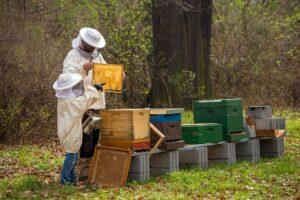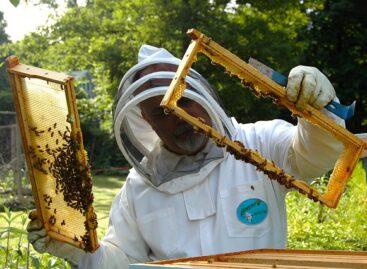The destructive effect of Chinese honey can only be mitigated with EU instruments
Domestic beekeepers are optimistic about this year’s acacia season, however, due to the persistently low purchase prices caused by the influx of Chinese – mostly counterfeit – honey into the European Union, it is expected that many large domestic honey-producing enterprises may cease their activities this year – stated Péter Bross, president of the National Hungarian Bee Association (OMME) for Agroinform.hu.

(Photo: Pixabay)
As a result of the very early arrival of spring, the generational change took place in the domestic apiaries by the middle of March this year, and the majority of the 1.2 million domestic bee families that overwintered began to lay eggs in good condition. The shoots of acacia survived the frosty days of March nationwide, and with weather similar to the current one, this year’s season of acacia honey can begin at the end of April. The white acacia is one of the most important domestic honey plants, and experts are very optimistic about it: acacia honey is expected to account for more than half of the expected domestic honey harvest of between 25 and 30 tons this year.
The EU recording market is in trouble
Although the prospects are favorable, the majority of the more than 20,000 domestic beekeepers still have to face a serious existential problem. 60-70 percent of domestically produced honey is exported, but at the same time, compared to the beginning of 2022, the price of honey has fallen by half in the EU, including in Italy, Germany and France, which three countries buy 80 percent of domestic honey exports.
The collapse of the EU honey market is caused by honey imports from third countries, such as Ukraine, Argentina, but mainly from China
According to the results of the honey test carried out by the European Commission last year covering 15 member countries, three quarters of the samples from Chinese exports proved to be fake, these products practically contained sugar syrup. Neither domestic nor other European producers are able to compete on price with these products, so they are constantly being pushed out of the market. In a special way, the market disturbances in the case of honey production mainly affect the large market players with at least 200-300 bee colonies, because the smaller players have worked for many years to form their own consumer circle, which they are able to reach through direct sales: through producer markets or online webshops. At the same time, sales in large batches cannot be replaced by “marketing”. “Although in Hungary it will be mandatory to indicate the countries of origin in the order of composition on the honey label from July 1st, the Union as a whole still has to wait for the birth of a similar regulation – added Péter Bross, president of OMME. “Until European customers can find out about the origin of the products they are consuming, they cannot be expected not to make decisions based on price.”
How can European, including Hungarian, beekeepers be saved?
The current Belgian EU presidency has taken steps to make the indication of origin mandatory, but this process is progressing very slowly. In addition to this important measure, steps such as, for example, are absolutely necessary Tightening the food book: by inserting parameters that Chinese honey counterfeiters cannot fulfill Tracking: not only within the EU, but also in third countries, it should be possible to track whether there is a real beekeeper behind the sold lot Reinstatement of customs duty: with the exemption from customs duty, Ukrainian producers do not win, only traders, but the current situation directly affects EU producers as well. “There has been some progress in the latter field: in addition to wheat, milk, eggs and poultry, the Union’s recently created so-called emergency brake regulation also included honey. This decree ensures that if any member country can prove that a large amount of Ukrainian products will flow in compared to the year 2022-23 and that it will cause market disruption, then the Union must decide within 14 days on the return of customs duties on that product” – Péter Bross added.
Related news
European Court of Auditors: EU Commission proposals affecting the common agricultural policy may cause uncertainty
🎧 Hallgasd a cikket: Lejátszás Szünet Folytatás Leállítás Nyelv: Auto…
Read more >Related news
II. Green Gastronomy – Marketing Communication Workshop organized by the MMSZ HoReCa and Green Section
🎧 Hallgasd a cikket: Lejátszás Szünet Folytatás Leállítás Nyelv: Auto…
Read more >Retail sales of organic products in Hungary increased by 13.9% – our country is the second fastest growing market in the European Union
🎧 Hallgasd a cikket: Lejátszás Szünet Folytatás Leállítás Nyelv: Auto…
Read more >Nearly 140 domestic suppliers, 60% growth – SPAR Regions Treasures program accelerates with AI solutions
🎧 Hallgasd a cikket: Lejátszás Szünet Folytatás Leállítás Nyelv: Auto…
Read more >







